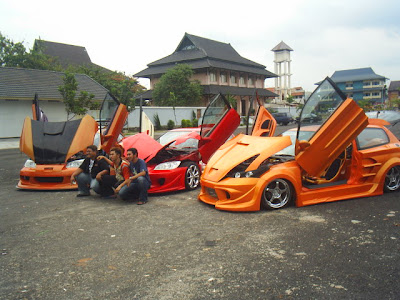The international car industry seems to be rattled by moves in the United States and Europe to force manufacturers to make cars more fuel-efficient.
Governments overseas see the change as an essential part of the effort to cut greenhouse gas emissions.
But in Australia there are no compulsory pollution standards for manufacturers. Australia's key scientific expert on emissions in the transport sector is warning that this will have to change.
Transport is the world's fastest growing source of greenhouse gas. When the burn-off from one litre of petrol mixes with the atmosphere, more than two kilograms of CO2 is created.
US President George W Bush has just signed a Bill which will increase the federal standard for car-makers. Vehicles will soon have to get 15 kilometres to the litre.
"One of the most serious, long-term challenges facing our country is dependence on oil, especially oil from foreign lands," Mr Bush said.
"It's a serious challenge and members of Congress up here understand the challenge, and so do I, because this dependence harms us economically through high and volatile prices at the gas pump.
"Dependence creates pollution and contributes to greenhouse gas emissions."
Fines for car makers
At the same time, the European Commission is proposing fines for car manufacturers whose cars exceed certain pollution levels.
European Automobile Manufacturers Association spokesman Ivan Hodac says it will lead to more expensive cars.
"If they miss the target by five grams, it means a penalty of 1.5 billion euros. This is unheard of in the European Union," he said.
The new law would limit European cars to 130 grams of CO2 per kilometre by the year 2012.
David Lamb from the CSIRO says that is a good target and would require a cut of about 30 grams on current levels. But Australian cars pollute more than European cars do.
"New cars sold in Europe last year averaged 161. The equivalent figure in Australia was 231 grams per kilometre," he said.
Mr Lamb, the leader of the CSIRO's low emission transport team, says Australian car manufacturers are not required to make their cars meet any pollution standards.
"Up to now we've had no legislation that compels cars, that legislates, mandates for specific targets. They've been voluntary targets," he said.
"There is a voluntary target that the industry, that the car makers in Australia agree to.
"They say they agreed that the average car sold would meet a 6.8 litres per 100 kilometres fuel consumption."
Obligation to toughen rules
Given the way Europe and the US are heading, Mr Lamb expects Australia will have mandatory standards before long.
"I'm absolutely certain we will because if we did not, we would be so out of step with what the rest of the world is doing," he said.
"We would be obliged, we would be leaned on by the other nations to adopt such standards. And besides which, the sort of vibes I've been feeling recently is that we want to get up onto the leadership in terms of environmental responsibility. We don't want to be at the laggard end."
Mr Lamb says it's getting to the stage where it would be irresponsible of Australia not have mandatory standards.
"That's the way I feel but I don't make the rules," he said.
But it's not just Australia's cars that could be more efficient. Mr Lamb says Australian drivers need to change their habits.
That means not buying a heavy vehicle like a four-wheel drive if you live in the city, and reducing time on the road.
"If I will need to buy a loaf of bread, is it fair to the rest of the world for me to jump in my car, start up a cold engine, accelerate up the street, which is when the emissions are far worse than if I was just cruising on the highway, to go and buy a loaf of bread?" he said.
There's no word on mandating pollution restrictions for car manufacturers in Australia, but the Federal Government is offering the industry $500 million to develop low-emissions vehicles, if the manufacturers put in $1.5 billion.
Read more...

























